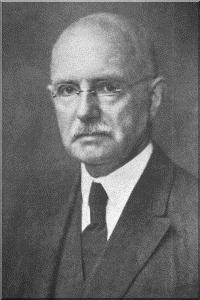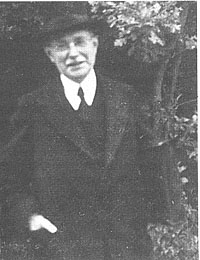<Back to Index>
- Philosopher Gerrit Mannoury, 1867
- Actor Jean Gabin (Jean Alexis Moncorgé), 1904
- Welsh Pirate Bartholomew Roberts (Black Bart), 1682
PAGE SPONSOR



Gerrit Mannoury (1867 – 1956) was a Dutch philosopher and mathematician, professor at the University of Amsterdam and communist, known as the central figure in the signific circle, a Dutch counterpart of the Vienna circle.
Gerrit Mannoury was born on 17 May 1867 in Wormerveer, and died on 30 January 1956 in Amsterdam. On 8 August 1907 he married Elizabeth Maria Berkelbach van der Sprenkel, with whom he had three daughters and a son, Jan Mannoury. His father Gerrit Mannoury, a sea captain, had died in China when he was three years old. He attended the Hoogere Burger School (HBS) in Amsterdam, where he graduated in 1885. The same year he received a Teacher's Degree in Accounting and in Mechanics. In 1902 he also received a Teacher's Degree in Mathematics. Mannoury was a self-educated mathematician. Because he was a teacher he couldn't attend lessons at the University of Amsterdam. He did receive private lessons from Diederik Korteweg. He was awarded a Ph.D. in Mathematics late in life, in 1946, with L.E.J. Brouwer as his advisor.
Mannoury started working in primary education in Amsterdam, Bloemendaal and Helmond. In 1910 he started teaching at the Hoogere Burger School (HBS) at Vlissingen. In 1902 he was appointed Privatdozent at the University of Amsterdam and in 1917 he was made professor there. He retired in 1937. He lectured on the philosophy of mathematics, and on mechanics, analytics and descriptive and projective geometry.
Mannoury was, with Diederik Korteweg, one of the most important teachers of Luitzen Egbertus Jan Brouwer at Amsterdam University, Mannoury especially philosophically. The first appearance of the names "formalism" and "intuitionism" in Brouwer's writings, were in a review of Gerrit Mannoury's book Methodologisches und Philosophisches zur Elementar - Mathematik (Methodological and philosophical remarks on elementary mathematics) from 1909. Two other Dutch scientists he inspired were philosopher and logician Evert W. Beth and psychologist Adriaan de Groot.
Mannoury's main inspirations were G.W.F. Hegel, G.J.P.J. Bolland and F.H. Bradley. He was also inspired by the work of Friedrich Nietzsche, Baruch Spinoza, the French mathematician philosopher of science Henri Poincaré and the English positivism of Bertrand Russell. Mannoury combined a logical - mathematical way of thinking with a deep insight into the human soul.